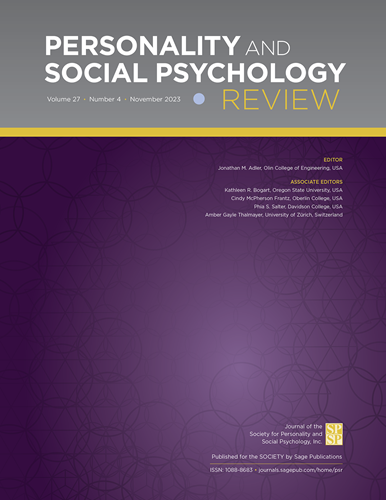Is Empathy the Default Response to Suffering? A Meta-Analytic Evaluation of Perspective Taking’s Effect on Empathic Concern
IF 7.7
1区 心理学
Q1 PSYCHOLOGY, SOCIAL
引用次数: 34
Abstract
We conducted a series of meta-analytic tests on experiments in which participants read perspective-taking instructions—that is, written instructions to imagine a distressed persons’ point of view (“imagine-self” and “imagine-other” instructions), or to inhibit such actions (“remain-objective” instructions)—and afterwards reported how much empathic concern they experienced upon learning about the distressed person. If people spontaneously empathize with others, then participants who receive remain-objective instructions should report less empathic concern than do participants in a “no-instructions” control condition; if people can deliberately increase how much empathic concern they experience, then imagine-self and imagine-other instructions should increase empathic concern relative to not receiving any instructions. Random-effects models revealed that remain-objective instructions reduced empathic concern, but “imagine” instructions did not significantly increase it. The results were robust to most corrections for bias. Our conclusions were not qualified by the study characteristics we examined, but most relevant moderators have not yet been thoroughly studied.同理心是对痛苦的默认反应吗?视角采取对共情关怀影响的元分析评价
我们对实验进行了一系列的元分析测试,在这些实验中,参与者阅读换位思考的指导——也就是说,想象一个痛苦的人的观点的书面指导(“想象自我”和“想象他者”的指导),或者抑制这种行为(“保持客观”的指导)——然后报告他们在了解痛苦的人时经历了多少共情关怀。如果人们自发地对他人产生共情,那么接受保持客观指示的参与者应该比“无指示”控制条件下的参与者报告更少的共情关注;如果人们能有意识地增加他们所经历的共情关注,那么想象自我和想象他人的指令相对于不接受任何指令应该会增加共情关注。随机效应模型显示,保持客观的指令减少了移情关注,但“想象”指令并没有显著增加移情关注。结果对大多数偏差校正都是稳健的。我们的结论不符合我们检查的研究特征,但大多数相关的调节因子尚未被彻底研究。
本文章由计算机程序翻译,如有差异,请以英文原文为准。
求助全文
约1分钟内获得全文
求助全文
来源期刊

Personality and Social Psychology Review
PSYCHOLOGY, SOCIAL-
CiteScore
19.00
自引率
1.90%
发文量
20
期刊介绍:
Title: Personality and Social Psychology Review (PSPR)
Journal Overview:
Official journal of SPSP, the Society for Personality and Social Psychology, Inc.
Premiere outlet for original theoretical papers and conceptual review articles in all areas of personality and social psychology
Features stimulating conceptual pieces identifying new research directions and comprehensive review papers providing integrative frameworks for existing theory and research programs
Topics Covered:
Attitudes and Social Cognition: Examines the inner workings of the human mind in understanding, evaluating, and responding to the social environment
Interpersonal and Group Processes: Explores patterns of interaction and interdependence characterizing everyday human functioning
Intergroup Relations: Investigates determinants of prejudice, conflict, cooperation, and harmonious relationships between social groups
Personality and Individual Differences: Focuses on causes, assessment, structures, and processes giving rise to human variation
Biological and Cultural Influences: Studies the biological and cultural mediation of social psychological and personality processes
 求助内容:
求助内容: 应助结果提醒方式:
应助结果提醒方式:


